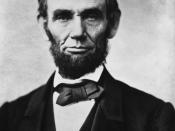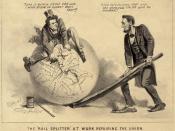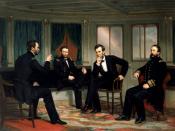Abraham Lincoln was born February 12, 1809 at sunrise. His birthplace was a one-room log cabin, which was sixteen feet long and eighteen feet wide. The tiny cabin had only one dimly-lit window and hard-packed earth for flooring.
When Abraham was six years old he and his sister Sarah walked two miles to a log cabin schoolhouse where he learned to read, write, and do arithmetic. Abe liked writing best of all and practiced it wherever he went. He wrote with charcoal on the back of a wooden shovel and even in dust and snow. There was little time for play, but between chores Abe liked to climb the rocky cliffs at Knob Creek Farm. There were no close neighbors so he was used to being alone and played by himself.
In December 1816 the Lincoln family moved to the backwoods of Indiana. The Lincolns settled near Pigeon Creek in Spencer County, which was about sixteen miles from the Ohio River.
In 1818 and epidemic of the milk sickness broke out. Drinking poisoned milk from cows that had eaten the wild snakeroot plant caused this sickness. Abe's mother Nancy was one of the first victims she died October 5, 1818. The next year Thomas Lincoln married Sarah Bush Johnston, a widow with three children. Abe was very attached to his kind stepmother and he referred to her as "my angel mother."
Abe's stepmother always encouraged his quest for knowledge. Whenever Abe's father could spare him form chores he attended school where he learned to read, write and to cipher. Though Abe had less than one full year of formal education in his life. Abe made up for his lack of schooling by reading, he always had a book by him. His first books were the Bible and Aesop's Fables.
Abe always kept teaching himself new things. He soon became interested in law reading all the books he could on law. Abe even walked miles to the nearest courthouse to hear lawyers try cases. He even crossed into Kentucky to listen in court.
When Abe was nineteen James Gentry, the local country storeowner, hired him to take a flatboat of cargo to New Orleans. Abe and Mr. Gentry's son built a flatboat and sailed down the Mississippi river to New Orleans. In New Orleans Abe saw his first slave auction and stated "Slavery is a constant torment to me."
After his trip to New Orleans Abe clerked at the country store and helped his father prepare to move to Illinois. In March 1830 the family set out on the 200-mile trip. The family settled on the Sangamon River. After a cold winter Thomas Lincoln moved 100 miles southeast into Coles County. This time Abe did not follow, instead he chose to live his own life.
Abe made a second trip to New Orleans and on his return was hired as a clerk in the village store of New Salem. Abe became a popular citizen of New Salem he won the respect and fellowship of the ruffians by wrestling their strongest men. Abe won the respect of the more peaceable citizens of the community with his good humor, intelligence, and his integrity.
When the Black Hawk War broke out in April 1832 Lincoln and the Clary's Grove men enlisted. Though Lincoln knew nothing of military life, the Clary's Grove men elected Lincoln as the captain of their rifle company. When his term expired he reenlisted as a private. His military career lasted three months, but he saw no actual fighting.
At the age of twenty-three Abraham Lincoln ran for the Illinois legislature. During his speech for the legislature a fight broke out, Abe strode up to the man who had started the fight, picked him up, and threw him out of the crowd Abraham then continued his speech. Abraham was defeated, there were thirteen county candidates running for four seats and he finished eighth.
In May 1833 Abraham was appointed postmaster of New Salem. The job gave him time to read all incoming newspapers and took little of his time. In the autumn of 1833 Abraham took appointment as deputy county surveyor. To learn the work Abe plunged into books studying all day and sometimes night. He learned surveying in six weeks.
In 1834 Lincoln ran for the Illinois legislature, he was elected in 1834 reelected in 1836,1838, and 1840. When John T. Stuart ran for a seat in the Congress of the United States in 1836 Abraham Lincoln replaced him as floor leader. Lincoln's main achievement as a state legislature was moving the state capital from Vandalia to Springfield.
In 1836 Lincoln became a licensed attorney, the following year he became a junior partner in John T. Stuart's law firm. Lincoln then moved to Springfield, he arrived there on a borrowed horse and all of his belongings in two saddlebags In Springfield Lincoln met Joshua Speed who gave him lodging and became his lifelong friend. There, in Springfield Lincoln established a reputation as a lawyer and took part in the busy social life of the city. In 1839 at a winter ball Abraham Lincoln met Mary Todd and from then on spent every free moment with her. They were married on November 4, 1842.
They lived in a rented room at the Globe Tavern in Springfield. There their first son Robert Todd was born. Late 1843 the Lincoln's moved into a tan light frame house on the edge of town. There Edward, William, and Thomas were born in 1846, 1850, and 1853. Of their for boys Robert reached adulthood. Edward was born in 1843 and died at the age of four. William was born in 1850 and died before his twelfth birthday. Thomas was born in 1853 and died at the age of eighteen. Mary and Abraham were entirely devoted to their sons and often spoiled them.
In 1847 Lincoln went to Washington D.C. as a representative form Illinois. His anti war speeches displeased the political supporters and he knew that they would not reelect him. At the end of his term in 1849 Lincoln resumed his law practice where he earned his reputation for honesty. Honest Abe would not take a case unless he believed that his client was innocent
In 1858 Lincoln won the Republican nomination for senator from Illinois. Lincoln ran against Stephen A. Douglass, a democrat who supported the Kansas-Nebraska Act. and had many supporters in both states. Lincoln overwhelmed Douglass in the debates, but lost the election.
At the Republican national convention in Chicago in 1860 Lincoln was nominated on the third ballot as the Republican nomination for president. The Democratic party was split and Abraham did not want to split the Republican party so he did not make a single political speech. His strategy won and Lincoln was elected the sixteenth president of the United States. He became the first Republican to become president on March 4, 1861
Six weeks after his inauguration the Civil War broke out on April 12, 1861. For months Lincoln tried to find a general to lead the Union forces, General George McClellan and many others had the chance to prove themselves. Soon Lincoln felt that he must take action. Lincoln assumed the title of Commander in Chief of the Army and the Navy. Lincoln was a successful commander in chief and first ordered a blockade of the Confederacy's ports, and expanded the regular army beyond the legal limits. Lincoln soon found a capable general, Ulysses S. Grant.
On September 22, 1862 President Lincoln issued the Emancipation Proclamation to abolish slavery in Washington D.C. The Proclamation was signed on January 1, 1863. By November 1864 Lincoln was nearly exhausted by the burden of war and the death of his son William. Lincoln believed that he would be defeated in the coming election. The people rallied with him and reelected him. When he gave his inaugural address March 4, 1865 the war was almost to an end. A month later on April 9, 1865 General Robert E. Lee surrendered his Confederate army to General Ulysses S. Grant. On April 11 the American Flag was raised over Fort Sumter where the war had begun.
To celebrate the victory Lincoln took Mary and two guests to the Fort's Theatre on April 14. During the third act John Wilkes Booth crept into the presidential box and shot President Lincoln in the head. Booth leapt onto the stage and escaped. Booth was shot and killed on April 26.
Soldiers carried the President to the nearest residence, a boardinghouse. There the unconscious President died at 7:22 A.M. on April 15, 1865. A funeral train carried Lincoln's body back home to Springfield Illinois, where he was buried in Oak Ridge Cemetery on May 4.
Only after his death did the world realize his greatness. He was a great statesman, a firm idealist, and a loving president who would forever be known as Honest Abe.
Bibliography:
1. Compton's Interactive Encyclopedia (CD) 98 Edition, Abraham Lincoln
2. Encarta Encyclopedia Deluxe (CD) 98 Edition, Abraham Lincoln
3. Abraham Lincoln The Prairie Years and the War Years, By Carl Sandburg, Published in 1993 by Galahad Books
4. http://www.americanpresidents .org/presidents/president.asp?President Number=16, updated 4/7/02
5. The Fate of Liberty: Abraham Lincoln and Civil Liberties, Mark E. Neely Jr., New York, 1991


